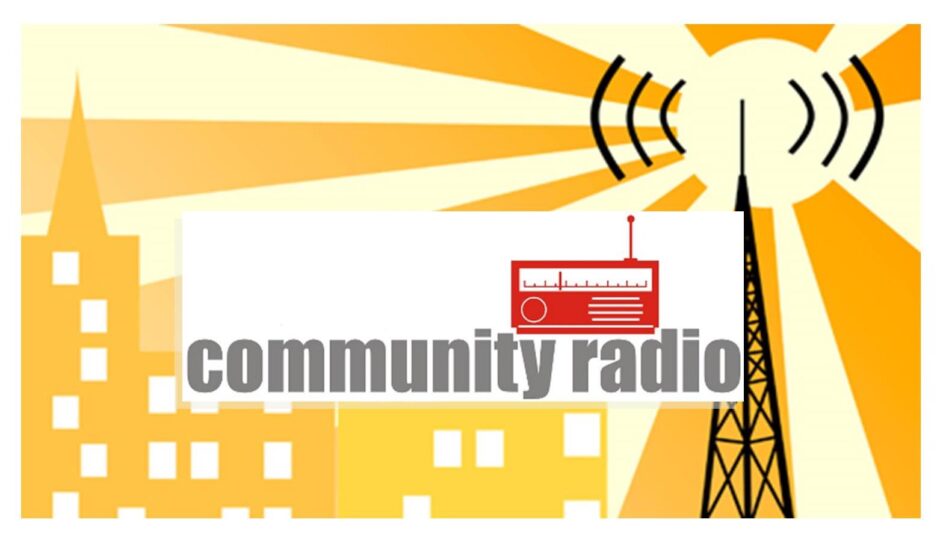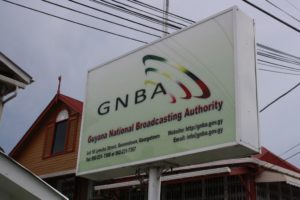Basic information on the setting up of Community Radio Stations in Guyana
The Guyana National Broadcasting Authority (GNBA) is encouraging qualified groups to consider applying for a Community Radio Station Licence which will allow them to establish and operate a Community Radio Station in Guyana. This Paper provides some basic information for those interested in establishing Community Radio Stations in Guyana.
WHAT IS COMMUNITY RADIO?
Community Radio is a specialised form of local public service radio. It is autonomous, non-commercial and relies on its own community-based resources for survival. What distinguishes it from state-owned or commercial radio is its participatory nature and ownership by the community as a whole.
It is a process whereby members of particular communities come together to design programmes articulating community concerns, produce and air them, set the vision and manage the day-to-day operational activities of the station.
Community radio is known globally as a voice for common people. It is a two-way process that allows ordinary people to identify and air common concerns and participate actively in rectifying these both with decision-makers and amongst community members themselves.
WHO CAN APPLY FOR A COMMUNITY RADIO LICENCE?
Community Radio is subject to the Broadcasting Act and its Amendment in 2017 and the general Guidelines for Broadcasters which is currently posted on the GNBA website until a specific Code of Practice for Community Radio is completed and approved by the GNBA.
As reflected in the current Broadcasting Act of 2011 and its Amendment in 2017, a broadcasting licence to carry on a community class broadcasting service shall be granted to:
“A Trust managed and controlled by a Board elected from among members of the community in the geographic area to be served”.
This excludes any company or Trust already carrying a commercial class broadcasting service.
WHAT IS THE PERIOD OF VALIDITY OF THE COMMUNITY RADIO LICENCE?
A period of one (1) year with the possibility of Renewal
WHAT ARE THE LICENCE FEES?
GYD$150,000 per annum
WHERE COULD COMMUNITY RADIO BE LOCATED?
A community radio station may exist within any of the broadcasting zones cited in the Broadcasting Act & its Amendment in 2017, except the Primary Zone.
COMMUNITY RADIO PROGRAMMING
The Focus of programming must be on local concerns and reflect the cultural, religious, language and demographic needs of the people in the community, bearing in mind the general mandatory requirement for public service programming –
(a) for a total of up to sixty minutes per day;
(b) between 6:00 hrs. and 22:00 hrs; and
(c) free of cost.
All licensees shall provide the authority:
(a) a fixed schedule; or
(b) a rotation of time slots, it intends to set aside to broadcast public service programmes. Interactive public participation must be encouraged at all possible levels…
- Documenting programming- cue sheets, song playlist, etc
MANAGEMENT AND SELF REGULATION
In keeping with GNBA’s thrust to encourage self-regulation, Community radio stations will be guided towards the establishment of a Code of Practice with agreed standards in all areas of CR activity, including station management and programming. This Code of Practice not only facilitates good programming practices and editorial independence but also protect from interference by vested interests.
In addition, in order to ensure accountability, facilitate good programming practices and editorial independence, the stations will also be encouraged to prepare and implement Codes of conduct, and facilitate regular public hearings in the community.
Stations will also be encouraged to set up local audience feedback mechanisms such as listenership groups etc to assist in programme monitoring and programme development.
VOLUNTEERING
Community Radio is built on the basis of volunteerism, hence local broadcasters and producers are not “paid” but offer their services for the good of the community. A system of volunteering must be introduced within the community radio stations to support consistent capacity building and skill enhancement at all levels,
ADVERTISING
Ads or announcements are open generally to community-based businesses, events and services only. Revenue generated from Ads and announcements must be used for operational expenses and capital expenditure of the stations.
FINANCIAL SUSTAINABILITY
Where there are surplus funds from the running of the community radio, these must be invested in the further development of the station.
Otherwise, local Fundraising and pursuit of grants and other forms of assistance as well as innovative revenue-earning activities are encouraged.
TECHNICAL REQUIREMENTS
The transmission radius of community radios is not more than five miles or of such other transmission distance as is specified in the broadcasting licence issued by the GNBA – transmitter of up to 20 watts is considered suitable.
The antenna must be placed to ensure as far as is practicable, that –
(a) broadcasting coverage does not exceed the broadcasting zone specified in the licence; and
(b) delivery of a viable signal in terms of clarity of picture and sound to all areas of the zone specified in the licence.
HOW TO APPLY?
Links to Application forms on the GNBA Website www.gnba.gov.gy
OTHER LINKS
In an effort not to re-invent the wheel please find below some useful links that may help in conceptualising and setting up a community radio station:
- Amendment of Broadcasting Act 2011 (2017): Section 21A;
- Guidelines for broadcasters
- Ramakrishnan, N. A User’s Guide to the technology and technical parameters of community radio in India, UNESCO 2007
- Fraser, Colin and Restrepo Estrada, Sonia: Community Radio Handbook, UNESCO 2001
- Sustainable Radio www.cameco.org/english/resources/radio-and-participation/
- World Association of Community Radio Broadcasters, AMARC): www.amarc.org
- Radio Toco, Trinidad and Tobago: http://www.comminit.com/democracy-governance/content/radio-toco-trinidad-tobago
- Community Radio Nepal: https://tiktakdoc.com/queue/community-radio-madanpokhara-net.html
- www.transformationsjournal.org/…/uploads/2017/01/Bosch…2005 Issue No. 10 — Media Communities Community radio in post-apartheid South Africa: The case of Bush Radio in Cape Town By Tanja Bosch Introduction
- Community Radio – The Handbook of Development Communication …onlinelibrary.wiley.com/doi/10.1002/…This chapter focuses on community radio as one form of community media, and explores how citizens and activists use community radio stations for development and social change, despite the challenges of financial sustainability. First, a brief history of community radio is provided, in an international context; after which the chapter explores various examples of how community radio stations operate…
By: Ms. Jocelyne Josiah, Former UNESCO Advisor in Communication and Information, Monitoring and Compliance Committee Chair and Board Member, GNBA



